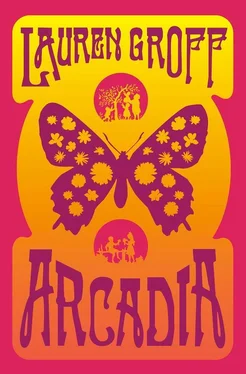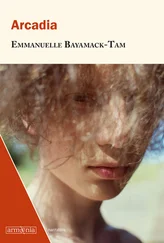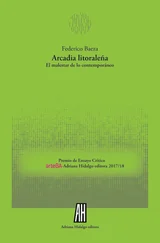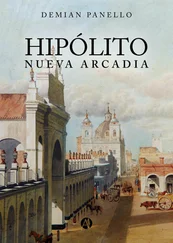Bit folds her small brown hand into his. Her nostrils go red and her eyelids do too and there’s something of the bunny about her as she wipes her cheeks on her shoulders. I’m not sure, she whispers, I’m capable of loving anybody.
Ellis, Bit says. Oh, honey, of course you are.
He lifts her knuckles to his mouth and kisses them, tasting the bitter almond of her skin. She stands suddenly, and says a hurried goodbye, and drives off, and all the next day Bit is afraid he’s scared her away. But she comes again at nine that night, and when she enters the house, the cool air in her clothes, she kisses him gravely on both cheeks, next to his lips, and leans her head against his chest and keeps it there for a long moment, just resting.
Then she says, I have a surprise, and goes out to her car, and a huge yellow Lab comes bounding out, a streak of sunlight in the night-darkened house. He rests his muzzle in Hannah’s lap and Luisa chases him from the kitchen with a broom and he wrestles with Grete until they both pant. Can Otto stay here? says Grete, grabbing the leonine head and shaking it until the dog nips gently at her wrist. Ellis grins at Bit. Not just yet, she says. Maybe soon.
Possibility, so strange in this house of sickness, washes over him. Soon, he agrees.
When Ellis drives away, a door seems to close behind her. In Mexico City, the morgues are full and the dead are stacked in the warehouse of a toy company. On Grete’s e-reader, the images rise: babies in their canvas shrouds, stacked under drifts of dolls with unblinking eyes. The image haunts Bit at night and makes him sit at the window to watch the comforting dark until his vision goes blurry with sleep.
Bit can hardly catch his daughter alone. She comes in at ten. He lifts himself, his body a heavy sack, and meets Grete at the kitchen sink.
Hey, Dad, she whispers. They can hear Hannah in her room, barking No! at Luisa, the last word she can say. Luisa always responds in her soft, kind voice. Grete’s track sweatshirt smells of the woodsmoke of some bonfire. On her breath, there is whiskey.
Oh, Grete, Bit says.
Don’t worry, she says.
I do, he says. The quarantine. Plus you’re fourteen. And you have the genes. I mean, your mother started a little younger than you—
Dad, she interrupts him. In the dim kitchen, she laughs. Listen.
Whippet-thin, she leans on the sink. She talks about running. About how she pushes until the pain builds so high in her limbs that it breaks into bliss, how she is a raw nerve here, at home, but when she runs she’s let loose from anxiety, how it threads itself all the way through her bones until she feels relief kindle in her, a kind of happiness.
I would do nothing to threaten that feeling, she says. Nothing.
He must seem dubious because she looks at him for a moment, holding something in. You’re a lot like Grumpy, you know, she says. You always have to take care of everyone else, and don’t let anyone take care of you. It’s kind of aggressive.
Aggressive? he says, startled. Me?
All I’m saying is, if you won’t let me take care of you, at least take care of yourself. She turns away and closes herself in her room.
In the morning, Bit hears her stir and rolls out of his bed in his running clothes. It is the kind of dawn that seems to seep out of the trees’ vibrant green. Grete comes onto the porch where he’s stretching and says a small Oh!
How far are we going? he says.
Until you drop, old man, she says and vanishes with impossible lightness into the waking forest. It is all he can do to follow on the path where she’s gone, the underbrush still shaking with her passage, each of his steps becoming its own reward, the day its own glory, his lungs’ bursting a good pain and his daughter falling back, at last, in kindness to him.
Hannah makes a wordless bray when Grete goes out the door. Grete waits, impatient, for the computer voice to flute out: You, my darling, are not wearing underwear.
Grete flushes and mutters, Grannah, Jesus. I forgot to do my laundry, not that it’s any of your business.
Hannah snorts, and the voice says, I can see your business. Hussy.
May Day, and he looks for nymphs dancing ribbons around poles but finds only the same sear that once afflicted August in his youth. The radio is an insect abuzz in the house, reporting heat-related deaths in the cities, five hundred thousand dead of SARI, general quarantine, hospital only for traumatic cases, airlines shut down. He flicks the box quiet before the personal stories begin. He can only bear tragedy if it’s abstract.
Glory comes in the mornings and fills the air with the warmth of baking pies. They cover most of Hannah’s newest smells: the ointments for her sores, the sickly whiff of her breath, the house-filling stink when she can manage to void her bowels.
Luisa lives with them on a cot in Hannah’s room; it is safer for her here, in exile. The hospital is in crisis mode, but everyone is afraid of SARI and nobody but the sickest come in, so the doctors and nurses spend their days playing cards and watching television until the director announces voluntary suspensions of noncritical staff. Ellis chooses this option and comes every morning; she naps beside Bit, atop the covers, when it’s Grete’s turn to watch Hannah. Grete’s school is closed. Yoko and Grete talk on the e-reader a hundred times a day. At night, the family eats the vegetables Hannah once canned, tasting the sun of other summers in them.
Sometimes Hannah seems so distant; he thinks she’s trying to pray. It makes sense, in the light of her decline. Bit also tries to pray when he is unable to sleep, but he keeps his eyes open, because when they are closed he sees God in the form of Handy, who is most definitely not God. He turns toward the window, the cold coin of the moon, and tells it stories about his day, to pull the shapeless mass of his time into some saving form.
At last, Bit comes to Hannah when her face is peaceful, and he asks her what she is doing. The voice says, Practicing.
What? he says, and her proxy voice swims out beautiful and smooth: Make tofu. Baste. Play Chopin. Launder. Shell peas. Curry horse. Bake scones. Fuck. Knead bread. Swim.
He sits in the rocking chair beside her. The women’s noises fill the house at his back. He will make raspberry jam in his head, he decides; he hasn’t done any preserving since he was a boy. He closes his eyes. At first he forgets steps, has to backtrack to squeeze the lemons, clean the berries, measure out the sugar, pluck the glass jars from the boiling water. But when he relaxes, things go vibrant. He feels the furry warmth of fresh raspberries in his fingers, and the smell rises up, sweet and tingling, made even brighter by memory.
The sun and wind pour into the sheets on the line. There are bodies in the billowing, forms created and lost in a breath. He takes photo after photo with his ruined film, to hold them there.
This is what, long ago, made him fall in love with photography: the paying of attention, the capturing of time. He’d forgotten exactly this.
He walks in, arms full of laundry, to find Grete shouting for him. He drops the clothing onto the kitchen counter, and socks roll across the tiles. He finds his daughter standing in the bathtub, Hannah leaning against the sink, her face gray, choking.
She knocks me back, Grete says. I try to help, she knocks me away.
Bit is also pummeled by Hannah’s sharp elbows but leans in. Her mucus is too heavy for her, impossible to swallow. Bit takes a washcloth, seizes Hannah’s head, and scrapes off the back of her tongue. She gasps: the color slowly flows back into her face. Tears roll down her cheeks and drip off. Bit cradles her head in his arms. When she is calm again, he wheels her into the kitchen to her computer. Into the heat of the afternoon, the voice at last comes: My body, she wisecracks, wants to kill me.
Читать дальше

![Andrea Höst - In Arcadia [Touchstone - Extras]](/books/56405/andrea-host-in-arcadia-touchstone-extras-thumb.webp)










